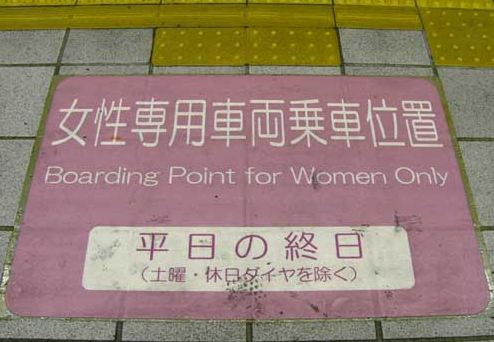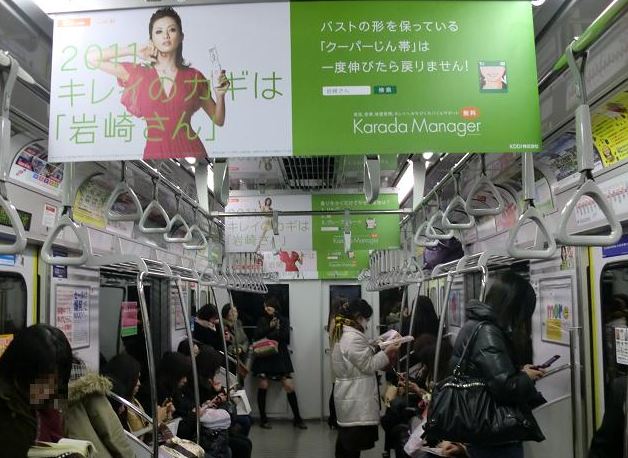
Women-only cars on Japan’s railways have existed in some form or other for more than 50 years, with “hana densha” (lit. “flower train”) carriages originally being introduced as a way of keeping female students safe from the advances of lecherous men during the peak hours. Now considered by many to be a vital part of many inner-city rail services, the train car closest to the driver’s cabin is often reserved for females only and is clearly marked both at boarding locations on the platform and inside the train itself.
Many unwitting foreign males have no doubt hopped on board these carriages during rush hours without realising it. Although foreigners usually escape relatively unscathed, when native Japanese men dare to cross that pink line and invade the sanctity of the josei senyou sharyou (women-only carriage), more often than not they are berated by the women on board until they alight or switch cars.
But is it actually illegal for a man to ride in the women-only car? Surely when other carriages are packed to the rafters, men shouldn’t be forced to squeeze in when the first car would be much less tortuous? Yahoo! Japan News spoke with legal professional Ikki Hashimoto as well as representative from Japan Rail to get the facts about men’s rights when it comes to riding the pink car.
Take almost any train into the city during the morning rush and you’ll almost always hear a least one announcement to passengers thanking them for reserving the first car for female passengers only. Paying close attention to these announcements, however, rather than set-in-stone rules they appear to be – as is often the case in Japan – more of a polite request than anything else.
“The first car is reserved for female passengers. We kindly ask all of our customers for their understanding and cooperation.”
But are men, in fact, obliged to cooperate with this request? If faced with the choice between stepping onto the women-only car or literally being shoved into one of the other, busier cars by a member of station staff, are men bound by law to choose the latter? Lawyer Ikki Hashimoto suggests that this is not the case:
“In short, although the system is based upon the cooperation and trust of (male) passengers, men will not be forcibly removed from [women-only] cars. In other words, what it comes down to is male passengers’ discretion. This is not a legally-enforced rule.”
With this in mind, Yahoo! Japan approached Japan Rail to ask for additional clarification. When asked whether male passengers may use women-only carriages, a representative responded carefully, saying, “Our official position is that we politely ask male passengers to refrain from doing so.”
It would seem that JR is in the somewhat awkward position of struggling to meet conflicting requests from its customers.
“We have been asked by some of our male passengers to abolish the ‘women-only’ car system, but on the other hand we have a lot of female passengers who are calling for us to increase the number of routes that offer women-only carriages.”
With groping and molestation on trains a serious problem in urban areas — particular on lines such as JR’s Saikyo line which runs between Saitama Prefecture and Tokyo and one of the few routes whose trains have CCTV cameras installed — one can understand the need to provide women with a space where they can travel safely. Packed into carriages and pressed against strangers for sometimes up to an hour at a time, the potential for idle hands to wander – particularly late at night when business people pour out of pubs and bars and cram onto the last few trains home – is clearly great. But with the majority of male passengers being perfectly decent human beings who would be just as offended by acts of groping as any female rider, are we punishing the many for the actions of an unsavoury few by removing their right to ride? Perhaps instead of barring men from using these carriages altogether we ought to restore trust and put emphasis on the moral obligation that both men and women have to help prevent and refuse to permit such abhorrent behaviour as groping? By denying men the right to board a particular carriage during busy times, are we labeling them all potential offenders? We’d love to hear your thoughts on the subject in the comments section below.
In the meantime, at the risk of setting the cat amongst the pigeons, it would appear that — provided you can handle the glares, comments and potential confrontations from extremely irked female passengers — you’re (at least legally) free to ride that car all you like, guys. We can’t promise you that it’ll be the most pleasant of journeys, though.
Source: Yahoo! Japan News


 Petition gathers support for men-only train carriages in Japan
Petition gathers support for men-only train carriages in Japan Majority of Japanese men in their 20s say they want men-only train cars in survey
Majority of Japanese men in their 20s say they want men-only train cars in survey Are Women-Only train cars illegal in Japan?
Are Women-Only train cars illegal in Japan? Majority of Japanese women in poll support idea of men-only train cars
Majority of Japanese women in poll support idea of men-only train cars “Men-only train car” to run in Tokyo as part of “Weak Men’s” association awareness campaign
“Men-only train car” to run in Tokyo as part of “Weak Men’s” association awareness campaign McDonald’s new Happy Meals offer up cute and practical Sanrio lifestyle goods
McDonald’s new Happy Meals offer up cute and practical Sanrio lifestyle goods All-you-can-drink Starbucks and amazing views part of Tokyo’s new 170 meter-high sky lounge
All-you-can-drink Starbucks and amazing views part of Tokyo’s new 170 meter-high sky lounge More foreign tourists than ever before in history visited Japan last month
More foreign tourists than ever before in history visited Japan last month Beautiful Sailor Moon manhole cover coasters being given out for free by Tokyo tourist center
Beautiful Sailor Moon manhole cover coasters being given out for free by Tokyo tourist center Mister Donut ready to make hojicha dreams come true in latest collab with Kyoto tea merchant
Mister Donut ready to make hojicha dreams come true in latest collab with Kyoto tea merchant Hamster abandoned at Tokyo ramen restaurant gets new home
Hamster abandoned at Tokyo ramen restaurant gets new home Studio Ghibli glasses cases let anime characters keep an eye on your spectacles
Studio Ghibli glasses cases let anime characters keep an eye on your spectacles Starbucks reopens at Shibuya Scramble Crossing with new look and design concept
Starbucks reopens at Shibuya Scramble Crossing with new look and design concept The oldest tunnel in Japan is believed to be haunted, and strange things happen when we go there
The oldest tunnel in Japan is believed to be haunted, and strange things happen when we go there Is the new Shinkansen Train Desk ticket worth it?
Is the new Shinkansen Train Desk ticket worth it? Disney princesses get official manga makeovers for Manga Princess Cafe opening in Tokyo
Disney princesses get official manga makeovers for Manga Princess Cafe opening in Tokyo We try out “Chan Ramen”, an underground type of ramen popular in the ramen community
We try out “Chan Ramen”, an underground type of ramen popular in the ramen community Beautiful new Final Fantasy T-shirt collection on the way from Uniqlo【Photos】
Beautiful new Final Fantasy T-shirt collection on the way from Uniqlo【Photos】 Foreign English teachers in Japan pick their favorite Japanese-language phrases【Survey】
Foreign English teachers in Japan pick their favorite Japanese-language phrases【Survey】 There’s a park inside Japan where you can also see Japan inside the park
There’s a park inside Japan where you can also see Japan inside the park Japanese convenience store packs a whole bento into an onigiri rice ball
Japanese convenience store packs a whole bento into an onigiri rice ball Studio Ghibli releases Kiki’s Delivery Service chocolate cake pouches in Japan
Studio Ghibli releases Kiki’s Delivery Service chocolate cake pouches in Japan Japan’s bone-breaking and record-breaking roller coaster is permanently shutting down
Japan’s bone-breaking and record-breaking roller coaster is permanently shutting down New definition of “Japanese whiskey” goes into effect to prevent fakes from fooling overseas buyers
New definition of “Japanese whiskey” goes into effect to prevent fakes from fooling overseas buyers Foreign passenger shoves conductor on one of the last full runs for Japan’s Thunderbird train
Foreign passenger shoves conductor on one of the last full runs for Japan’s Thunderbird train Our Japanese reporter visits Costco in the U.S., finds super American and very Japanese things
Our Japanese reporter visits Costco in the U.S., finds super American and very Japanese things Kyoto bans tourists from geisha alleys in Gion, with fines for those who don’t follow rules
Kyoto bans tourists from geisha alleys in Gion, with fines for those who don’t follow rules Studio Ghibli unveils Mother’s Day gift set that captures the love in My Neighbour Totoro
Studio Ghibli unveils Mother’s Day gift set that captures the love in My Neighbour Totoro Domino’s Japan now sells…pizza ears?
Domino’s Japan now sells…pizza ears? New Japanese KitKat flavour stars Sanrio characters, including Hello Kitty
New Japanese KitKat flavour stars Sanrio characters, including Hello Kitty Sales of Japan’s most convenient train ticket/shopping payment cards suspended indefinitely
Sales of Japan’s most convenient train ticket/shopping payment cards suspended indefinitely Sold-out Studio Ghibli desktop humidifiers are back so Totoro can help you through the dry season
Sold-out Studio Ghibli desktop humidifiers are back so Totoro can help you through the dry season Japanese government to make first change to romanization spelling rules since the 1950s
Japanese government to make first change to romanization spelling rules since the 1950s Ghibli founders Toshio Suzuki and Hayao Miyazaki contribute to Japanese whisky Totoro label design
Ghibli founders Toshio Suzuki and Hayao Miyazaki contribute to Japanese whisky Totoro label design Doraemon found buried at sea as scene from 1993 anime becomes real life【Photos】
Doraemon found buried at sea as scene from 1993 anime becomes real life【Photos】 Tokyo’s most famous Starbucks is closed
Tokyo’s most famous Starbucks is closed One Piece characters’ nationalities revealed, but fans have mixed opinions
One Piece characters’ nationalities revealed, but fans have mixed opinions We asked a Uniqlo employee what four things we should buy and their suggestions didn’t disappoint
We asked a Uniqlo employee what four things we should buy and their suggestions didn’t disappoint Princesses, fruits, and blacksmiths: Study reveals the 30 most unusual family names in Japan
Princesses, fruits, and blacksmiths: Study reveals the 30 most unusual family names in Japan Studio Ghibli’s new desktop Howl’s Moving Castle will take your stationery on an adventure
Studio Ghibli’s new desktop Howl’s Moving Castle will take your stationery on an adventure One of Tokyo’s busiest subway lines is adding women-only cars
One of Tokyo’s busiest subway lines is adding women-only cars “Passengers who don’t want to be groped, please use the rear train cars” announcement angers Japan
“Passengers who don’t want to be groped, please use the rear train cars” announcement angers Japan Japanese Twitter users happy to see men on women-only train car in India get slapped by police
Japanese Twitter users happy to see men on women-only train car in India get slapped by police Train company asks parents with baby strollers to be polite to other passengers, sparks backlash
Train company asks parents with baby strollers to be polite to other passengers, sparks backlash 22 February turned out to be a bad day for Tokyo train commuters, as freak delays showed
22 February turned out to be a bad day for Tokyo train commuters, as freak delays showed Mysterious yellow liquid sent to Nagoya officials with message to “end women-only train cars”
Mysterious yellow liquid sent to Nagoya officials with message to “end women-only train cars” Breaking: Passengers stabbed on Japanese train in Tokyo
Breaking: Passengers stabbed on Japanese train in Tokyo Can you guess where this amazing Japanese commuter train is hiding some extra seats? 【Video】
Can you guess where this amazing Japanese commuter train is hiding some extra seats? 【Video】 Magical train ride through Japan’s autumn leaves is like travelling to a different world【Video】
Magical train ride through Japan’s autumn leaves is like travelling to a different world【Video】 Disturbing video shows man hitting woman for crossing her legs on Japanese train【Video】
Disturbing video shows man hitting woman for crossing her legs on Japanese train【Video】 Backlash as Japanese police tweet warns women to not ride elevators alone with men
Backlash as Japanese police tweet warns women to not ride elevators alone with men Osaka earthquake hits city during peak hour, passengers freed after trains suspended
Osaka earthquake hits city during peak hour, passengers freed after trains suspended Tokyo train adding family-only cars to evening commuter express in March
Tokyo train adding family-only cars to evening commuter express in March Sushi chef drops knives on the train, causes panic and delays
Sushi chef drops knives on the train, causes panic and delays
Leave a Reply